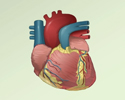Fiber
Fiber is a substance found in plants. Dietary fiber, which is the type of fiber you can eat, is found in fruits, vegetables, and grains. It is an important part of a healthy diet.
Function
Dietary fiber adds bulk to your diet. Because it makes you feel full faster, it can help with weight control. Fiber aids digestion and helps prevent constipation. It is sometimes used for the treatment of diverticulosis, diabetes, and heart disease.
Constipation
Constipation is when you do not pass stool as often as you normally do. Your stool may become hard and dry, and it can be difficult to pass....

Diverticulosis
Diverticula are small, bulging sacs or pouches that form on the inner wall of the intestine. Diverticulitis occurs when these pouches become inflame...

Diabetes
Diabetes is a long-term (chronic) disease in which the body cannot regulate the amount of sugar in the blood.

Heart disease
Coronary heart disease is a narrowing of the blood vessels that supply blood and oxygen to the heart. Coronary heart disease (CHD) is also called co...

In Western societies such as the United States, a diet low in fiber has been linked to higher rates of:
- Irritable bowel syndrome
Irritable bowel syndrome
Irritable bowel syndrome (IBS) is a disorder that leads to pain in abdomen and changes in bowel movements. IBS is not the same as inflammatory bowel...
 ImageRead Article Now Book Mark Article
ImageRead Article Now Book Mark Article - Diabetes
Diabetes
Diabetes is a long-term (chronic) disease in which the body cannot regulate the amount of sugar in the blood.
 ImageRead Article Now Book Mark Article
ImageRead Article Now Book Mark Article - Obesity
Obesity
Obesity means weighing more than what is healthy for a given height. Obesity is a serious, chronic disease. It can lead to other health problems, i...
 ImageRead Article Now Book Mark Article
ImageRead Article Now Book Mark Article - Cardiovascular disease
- Colon cancer
Colon cancer
Colorectal cancer is cancer that starts in the large intestine (colon) or the rectum (end of the colon). It is also sometimes simply called colon ca...
 ImageRead Article Now Book Mark Article
ImageRead Article Now Book Mark Article
Food Sources
There are two forms of fiber: soluble and insoluble.
Soluble fiber attracts water and turns to gel during digestion. This slows digestion. Soluble fiber is found in oat bran, barley, nuts, seeds, beans, lentils, peas, and some fruits and vegetables. Research has shown that soluble fiber lowers cholesterol, which may help prevent heart disease.
Insoluble fiber is found in foods such as wheat bran, vegetables, and whole grains. It appears to speed the passage of foods through the stomach and intestines and adds bulk to the stool.
Side Effects
Eating a large amount of fiber in a short period of time can cause intestinal gas (flatulence), bloating, and abdominal cramps. This problem often goes away once the natural bacteria in the digestive system get used to the increase in fiber. Adding fiber to the diet slowly, instead of all at one time, can help reduce gas or diarrhea.
Flatulence
Gas is air in the intestine that is passed through the rectum. Air that moves from the digestive tract through the mouth is called belching. Gas is ...

Bloating
Abdominal bloating is a condition in which the belly (abdomen) feels full and tight. Your belly may look swollen (distended).

Abdominal cramps
Abdominal pain is pain that you feel anywhere between your chest and groin. This is often referred to as the stomach region or belly.

Too much fiber may interfere with the absorption of minerals such as iron, zinc, magnesium, and calcium. In most cases, this is not a cause for too much concern because high-fiber foods tend to be rich in minerals.
Recommendations
On average, Americans now eat about 16 grams of fiber per day. The recommendation for older children, adolescents, and adults is to eat 21 to 38 grams of fiber each day. Younger children will not be able to eat enough calories to achieve this amount, but it is a good idea to introduce whole grains, fresh fruits, and other high-fiber foods.
To ensure that you get enough fiber, eat a variety of foods, including:
- Cereals
- Dried beans and peas
- Fruits
- Vegetables
- Whole grains
Add fiber gradually over a period of a few weeks to avoid stomach distress. Water helps fiber pass through the digestive system. Drink plenty of fluids (about 8 glasses of water or noncaloric fluid a day).
Taking the peels off fruits and vegetables reduces the amount of fiber you get from the food. Fiber-rich foods offer health benefits when eaten raw or cooked.
Reviewed By
Linda J. Vorvick, MD, Clinical Professor, Department of Family Medicine, UW Medicine, School of Medicine, University of Washington, Seattle, WA. Also reviewed by David C. Dugdale, MD, Medical Director, Brenda Conaway, Editorial Director, and the A.D.A.M. Editorial team. Editorial update 11/15/2024.
Hensrud DD. Diet and nutrition. In: Goldman L, Cooney KA, eds. Goldman-Cecil Medicine. 27th ed. Philadelphia, PA: Elsevier; 2024:chap 13.
US Department of Agriculture and US Department of Health and Human Services. Dietary Guidelines for Americans, 2020-2025. 9th ed. www.dietaryguidelines.gov/sites/default/files/2020-12/Dietary_Guidelines_for_Americans_2020-2025.pdf. Updated December 2020. Accessed November 12, 2024.


 All rights reserved.
All rights reserved.